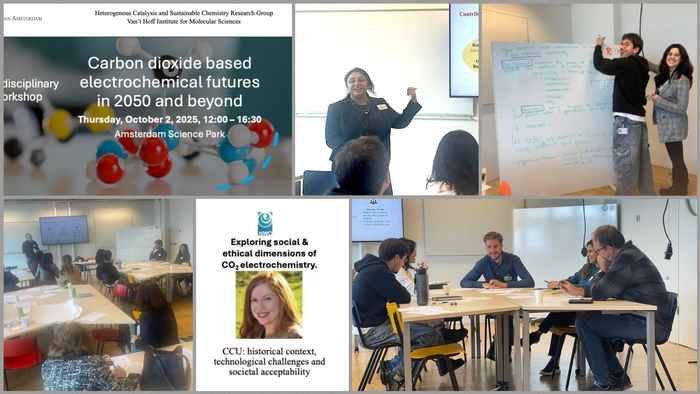Reflecting on responsible research and innovation in CO2 electrochemistry
Transdisciplinary workshop at the Van ‘t Hoff Institute for Molecular Sciences
16 October 2025
The workshop brought together participants from academia, business and policy to anticipate the role of CO2-based electrochemistry for a sustainable future in northwestern Europe beyond 2050. Through card-based exercises, imaginaries and thought experiments, participants reflected on their notions of a sustainable future, how their work contributes to it, what is going well and what could be done differently.
The workshop took place as part of an ongoing NWO-funded responsible research and innovation project to investigate social and ethical dimensions of emerging technologies. The project team includes chemists Amanda Garcia (principal investigator) and Gadi Rothenberg as well as social science researcher Sanghamitra Chakravarty, all staff members of the Heterogeneous Catalysis and Sustainable Chemistry Research Group. Other group members Matthijs Hage, Lisa Rossetti, Noë Watson, Nina Chen and Eryk Szmuniewski supported the event organisation and brought in voices of emerging (electro)chemists to the discussion.
The relevance of social and ethical dimensions
The workshop was held against the background that technological development and innovation depend on a complex interplay of factors. Even though the relevance of economic, social, cultural, political and contextual aspects has been well established, it is challenging to fully appreciate the implications of such factors outside one’s own domain of expertise. Further, technologies must be developed and adopted with careful consideration of any unintended consequences and harms that may emerge later. To complicate matters further, people may hold different interpretations of sustainability and the ideal path towards it.
While the conversations during the workshop revealed a great variety of differences in expectations in a seemingly homogenous group, there was unanimous agreement on one point: that social and ethical dimensions of research and innovation are of paramount importance and not enough is being done to take these into account. Participants emphasised the importance of spaces of interaction, reflection and creative thinking, but with a structured approach. Although this may have been the first time such a transdisciplinary futures workshop was held at HIMS, it is likely that many more will follow.

If you are working in CO2 electrochemistry and are interested in organising similar structured discussions within your own research group, feel free to reach out to Amanda Garcia or Sanghamitra Chakravarty.
See also
NWO: Green light for research into societal aspects of Electrochemical Conversion and Materials